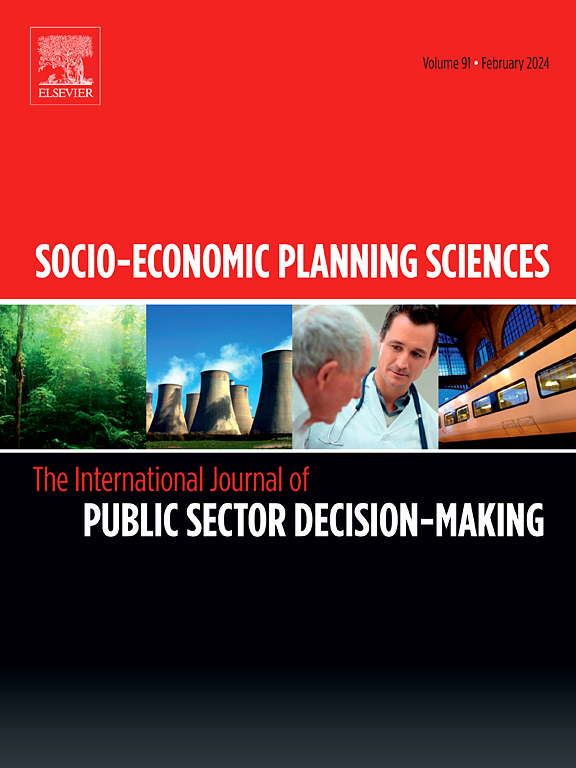Assessing the resilience of water and wastewater utilities: A multi-criteria approach for Chile
IF 5.4
2区 经济学
Q1 ECONOMICS
引用次数: 0
Abstract
Ensuring the operational resilience of water and wastewater utilities (WWUs) is critical for safeguarding public health, environmental sustainability, and service continuity in the face of natural and human-induced hazards. This study develops an innovative Operational Resilience Index (ORI) to comprehensively assess WWU operational resilience from a regulatory perspective. The ORI integrates multiple resilience indicators across three key dimensions—service performance, asset management, and water security—using a Multi-Criteria Decision Analysis (MCDA) approach, incorporating expert and stakeholder preferences through the Best-Worst Method (BWM). The methodology is applied to 29 WWUs in Chile, a country with high exposure to natural disasters. The weights assigned to resilience indicators indicate a preference for short-term service performance over long-term infrastructure resilience. The estimated ORI values range from 0.524 to 0.808, with the maximum achievable score being 1.000. It was evidenced that asset management represents the most critical area for improvement, indicating a need for regulatory incentives to promote infrastructure renewal. While no statistically significant differences in ORI scores were found based on WWU ownership structure (public, private, or concessioned), concessioned WWUs demonstrated statistically superior performance in asset management (p-value = 0.012), underscoring the need for targeted regulatory measures to strengthen this dimension in other ownership models The ORI provides a systematic benchmarking tool for regulators, enabling resilience-based performance assessments and targeted policy interventions.
评估水和污水处理设施的复原力:智利的多标准方法
在面对自然和人为危害时,确保水和废水公用事业的运行弹性对于保障公众健康、环境可持续性和服务连续性至关重要。本研究从监管的角度构建了一个创新的运营弹性指数(ORI),以全面评估WWU的运营弹性。ORI采用多标准决策分析(MCDA)方法整合了服务绩效、资产管理和水安全三个关键维度的多个弹性指标,并通过最佳-最差方法(BWM)结合了专家和利益相关者的偏好。该方法应用于智利的29个世界水单位,智利是一个自然灾害频发的国家。分配给弹性指标的权重表明,短期服务性能优于长期基础设施弹性。估计的ORI值范围为0.524 ~ 0.808,最大可实现分数为1.000。有证据表明,资产管理是最需要改进的领域,这表明需要采取监管激励措施来促进基础设施更新。虽然基于WWU所有权结构(公共、私人或特许)的ORI得分在统计上没有显著差异,但特许WWU在资产管理方面表现出统计上的优势(p值= 0.012),强调需要有针对性的监管措施来加强其他所有权模型中的这一维度。ORI为监管机构提供了系统的基准工具。实现基于弹性的绩效评估和有针对性的政策干预。
本文章由计算机程序翻译,如有差异,请以英文原文为准。
求助全文
约1分钟内获得全文
求助全文
来源期刊

Socio-economic Planning Sciences
OPERATIONS RESEARCH & MANAGEMENT SCIENCE-
CiteScore
9.40
自引率
13.10%
发文量
294
审稿时长
58 days
期刊介绍:
Studies directed toward the more effective utilization of existing resources, e.g. mathematical programming models of health care delivery systems with relevance to more effective program design; systems analysis of fire outbreaks and its relevance to the location of fire stations; statistical analysis of the efficiency of a developing country economy or industry.
Studies relating to the interaction of various segments of society and technology, e.g. the effects of government health policies on the utilization and design of hospital facilities; the relationship between housing density and the demands on public transportation or other service facilities: patterns and implications of urban development and air or water pollution.
Studies devoted to the anticipations of and response to future needs for social, health and other human services, e.g. the relationship between industrial growth and the development of educational resources in affected areas; investigation of future demands for material and child health resources in a developing country; design of effective recycling in an urban setting.
 求助内容:
求助内容: 应助结果提醒方式:
应助结果提醒方式:


